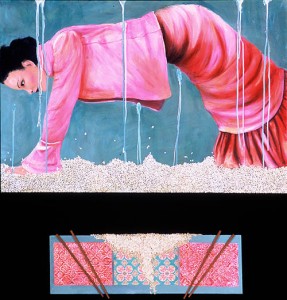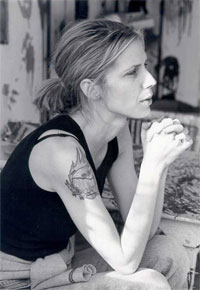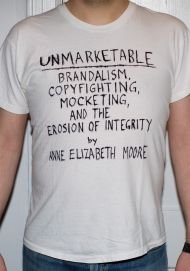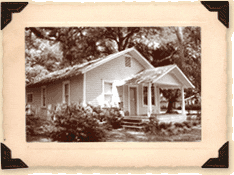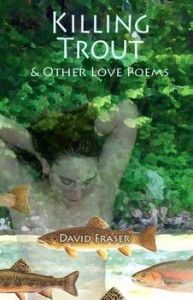We just got back from one of those refreshing getaways that help us to survive long Michigan winters and living in a small town. The event was “Writing in Public: A Celebration of Karl Pohrt,” sponsored by the University of Michigan and the support of the good people of Ann Arbor. Karl Pohrt is the founder and owner, for the past 27 years, of Shaman Drum Bookshop in downtown, a-block-from-the-university Ann Arbor. He is one of a dwindling breed of independent bookstore owners and book lovers who works tirelessly and with a continued passion to bring both new and well-known authors and important and sometimes difficult issues to his community.
There to celebrate Pohrt were guest authors Andrea Barrett and Gary Snyder, both of whom read on Thursday evening. On Friday, there were three panels: Literary Publishing, Writing in the Schools, and From Page to Screen. We were able to attend Literary Publishing with Sven Birkerts, Editor of Agni, Michale Wiegers, Executive Editor of Copper Canyon, and Rebecca Wolff, Editor and Publisher of Fence Magazine and Fence Books.
Each of these three speakers provided great insight into their particular niche of publishing. (I hope Michael will hold good on his word and provide us with a copy of his remarks to be published on the site soon.) Birkerts, being the college professor that he is, is the kind of speaker from whom I wish I could take a class, just to hear him speak. He is interesting, thoughtful and honest, and whether from reading his books or hearing him speak, always strikes a chord with me that resonates in my thinking for days, and, in some cases, years.
 Birkerts talked about his daily grind as editor of Agni, of coming to work each day to find a mail bin filled with manila envelopes, most of which he knows will be returned to the sender. Each day, he enters and there’s a full bin, and when he leaves, it’s empty: “it’s the systole-diastole of literary respiration in the American culture,” he commented. And “rather than being cynical or jaded” about the repetitiveness of the work, he described it instead as renewing a feeling of “ongoingness” for him, to come in each day and see the bin refreshed with submissions.
Birkerts talked about his daily grind as editor of Agni, of coming to work each day to find a mail bin filled with manila envelopes, most of which he knows will be returned to the sender. Each day, he enters and there’s a full bin, and when he leaves, it’s empty: “it’s the systole-diastole of literary respiration in the American culture,” he commented. And “rather than being cynical or jaded” about the repetitiveness of the work, he described it instead as renewing a feeling of “ongoingness” for him, to come in each day and see the bin refreshed with submissions.
The process, he went on to detail, starts with his opening each envelope, beginning to read, and “waiting to be struck.” He’s not “looking to determine the ultimate value and worth” of the piece, but rather is “looking for traces of something we would want for the journal.” How often I have heard the woes of editors upon reading submissions: “Don’t they even read our journal before they submit?” Birkerts’s comments hit to the heart of this, assuring that “it may be a great story, but not what we are looking for.”
And what is Birkerts looking for? He commented that his role is not in personal reading but rather “public reading: in the capacity as a representative of the journal.” That he looks at the work in the larger context of “what’s going on in our culture. What our culture needs. What there’s too much of in our culture. What’s under threat in our culture.” Surely, a huge role for any one individual to take on, but at the same time, the very reason Agni has been and endures as a leading literary journal.
Knowing that the majority of the submissions will be sent back to the authors, Birkerts commented that he makes rejections very carefully: “I’m aware that every submission that goes back, goes back to a person that invested a lot of hope in this.” Indeed, a writer friend of mine who has been rejected a *few* times by Agni said he was actually okay with the rejection because he at least got a note with each one. He felt his efforts had been respected, and in turn, he respected the rejection. What a great comment on the sense of connection and community inherent in the submission and publishing process.
However, Agni, like so many publications now, is turning to e-submissions. After the panel, I questioned Birkerts on how this process was going to change what he had so endearingly referred to as his ‘morning meditation,’ and I, his ‘zen process’ of handling manuscripts. He offered his cautious concern, indicating he was still sorting his feelings on this one, that, like so many of us who hold to our books vs. ebooks, he will miss the tactile nature of the process. Ultimately, though, his reconciliation was that the origin and the destination of literary submission has not changed, only the process in the middle. That the writer is still creating and making art, and the publication to which it is submitted still involves a reader who is making meaning. It seems to touch upon a “deep grain of literary opposites” he contended, yet at the same time, e-submission is something he believes will help offer a “kind of leveling” for those making their submissions (specifically, he mentioned receiving submissions from India; that e-submissions may open that international door a bit wider).
Perhaps for the publisher, this is true, but for those like my writer friend, I’m not sure getting a form e-response rejection will be a welcome component of this methodology. Let’s just hope if there’s a space for “comments” on those e-submission rejections that will allow publishers to continue (or in some cases begin) to maintain the connection between writer and reader by offering a few words in respect of that investment of hope.
Without a doubt, there would likely be fewer of those rejections if only writers would familiarize themselves with the journals to which they send their works. Sending out blind submissions with greater ease (I know it happens because NewPages often gets literary submissions for our “magazine”- ?!) or using database services to mass-submit to magazines the writer has never even heard of , let alone read, have become the downside of e-submissions.
For editors like Birkerts, who are seasoned professionals in their work, handling the onslaught may not prove as great a challenge. If the first few lines don’t ring true, Birkerts moves on. In a final demonstration of his process, Birkerts opened the most recent issue of Agni (66) and read the opening lines from Harrison Solow’s essay, “Bendithion”:
“Vulcans have an inner eyelid.
“On one of the episodes of Star Trek, Mr. Spock is invaded by a fatal parasite on a remote planet. Exposure to high-intensity light appears to be the only cure—a treatment that would blind humans. Because of Vulcan physiology, however, a hidden ocular membrane descends to shut out intrusive rays, and Spock emerges intact, undamaged by his contact with an alien world.
“It turns out that y Cymry have an inner eyelid as well. More like an obfuscatory veil than a solid barricade, it allows the Welsh to see out, but effectively shades the inner self from the eyes of the inquisitive, casting all that is behind it in shadow. It is a dusky looking glass, presented innocently enough to the stranger, deceptively luminous and reflective, its transparency clearly controlled by time and measured, in nanobytes, by trust.”
And Margo Berdeshevsky’s story “Pas de Deux, à Trois”:
“Ok, blond. Ok, fifty. Ok, an emotional centipede, a poet, a vagabond. Ok, she drinks tea with milk, café au lait, when it doesn’t make her breasts ache. Ok, is homeless in spirit and has a house between a sleeping volcano and the wind-slapped sea and nowhere—now she has a pied à terre in Paris. Lucky bitch. Wait. Needless. Survivor. And suckles love like every other human. Meditative. Can sing in an alto-husk sort of way. Can climb hills. Can speak French very well, Russian very badly, can say good night in Indonesian, good morning in Tagalog. Can dance a tango barefoot, worries about her shape, waltzes clumsily. Likes: nakedness, Renoir, early Picasso, late Pinter, late Shakespeare, early W. S. Merwin, nature, beauty, sex, cognac, museums, cello, empty space, solid oak tables, old torqued trees with twisted fattened trunks and dwarf red birds fighting over high notes, the taste of rain, the taste of sperm, the smell of Eau Sauvage Cologne for men splashed on her own skin, Fragonard perfume, the smell of darkest red, the smell of praise, bundled wheat, mountains, the cry that might be love, kissing, white silk, walking-boots. There are wiser women. The tests of our faith are like that classic: spin flax into gold, empty thimblefuls of lakes into thirsty canyons.”
After both of which he commented, “These are stories I want to know more about.”
***
In addition to having selections from past issues accessible online, Agni has started a new online exclusive feature through which they hope to publish as much original content online per year as they do in the print journal. But, don’t worry, for now at least, Agni has no intention of going completely online. When that happens, Birkerts said he would need to “go find a small patch of woods in which to live, if there’s any left.”



